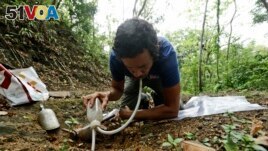16 February 2022
Some Latin American scientists had to become creative to do research when the coronavirus pandemic hit. They say that had it not been for the pandemic, they may have not considered new ways to do important research.
Innovate and look for alternatives
Biologist Claudio Monteza had just finished a master's degree in the United States when he stopped in Panama for a few days. He had a planned flight to Germany to begin his doctoral studies. Then the world began shutting down. He started taking doctoral classes online.

Dumas Galvez, a researcher of the Smithsonian Tropical Research Institute, collects ants from a nest in Paraiso, Panama, April 13, 2021. (AP Photo/Arnulfo Franco)
Because of the pandemic, many scientists "have had to innovate and look for alternatives," Monteza said.
An alternative is a different way of doing something.
After governments ordered quarantine measures, Monteza realized he might get permission for research if he studied highways. He believed they could be studied without large amounts of travel.
Monteza believes the highway research could lead governments to create crossings for wild animals such as armadillos, lowland pacas and agoutis, among others.
Creative solutions
Erick Núnez is head of the Panama Environmental Ministry's biodiversity department.
He said that during the first half of 2020, when Panama was under quarantine, scientists had almost "zero mobility." Núnez added, "There was very little research."
Later, the Health Ministry began to loosen restrictions and permit some scientists to work in protected areas alone or in small groups, Núnez said.
Mariana Munoz-Romo is a researcher with the Smithsonian Institution. Before the coronavirus arrived she had planned to capture a large number of bats from different places around the Panamanian town of Gamboa. But, pandemic restrictions soon made that impossible.
So she found a new way to study the flying mammals. Instead of looking at them in a lab, Munoz-Romo watched the bats on video. Cameras were set up in the bats' natural homes.
The researcher is studying the sex lives of the animals. She is especially interested in learning the purpose of a strong-smelling substance on the forearms of the fringe-lipped bat.
"Analyzing these recordings is fabulous because you can generate a mountain of information," said Munoz-Romo, a professor at the University of the Andes in Merida, Venezuela.
When the pandemic closed his laboratory in Gamboa, Dumas Gálvez moved many ant colonies to his home in Paraiso. He wanted to continue observing them as part of his research into their immune systems.
"I had to look for alternatives," Gálvez said.
So, first he remodeled a room in his house so that it could hold up to 100 ant colonies. His largest colonies were around 200 ants, so he had an estimated 13,000 ants in his home.
He watched them for months. But the conditions in the room were poor.
"It was very hot," he said. The ants began to die.
The pandemic prevented him from going out to collect more ants, so he began studying the interaction of ants and a small frog that eats them.
Panama has since eased its pandemic restrictions, and the Smithsonian is reopening its centers there. Gálvez has been able to do field work again and work with students.
"If not for the pandemic, I wouldn't have invested the energy in considering alternatives," he said. "I probably would not have ever done this project."
I'm John Russell.
Kathia Martinez reported on this story for the Associated Press. John Russell adapted it for Learning English.
________________________________________________________________
Words in This Story
innovate – v. to do something in a new way : to have new ideas about how something can be done
mobility – n. ability to move quickly and easily
analyze – v. to study (something) closely and carefully : to learn the nature and relationship of the parts of (something) by a close and careful examination
interaction – n. the act of coming together and have an effect on each other